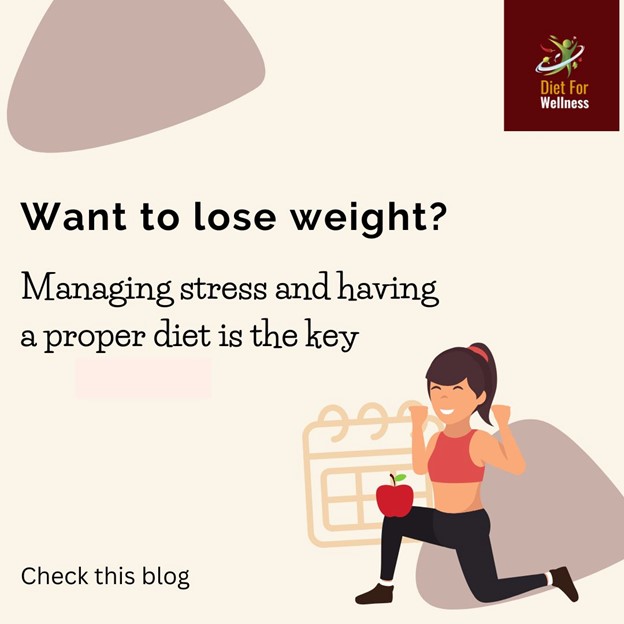Managing stress and the right diet to achieve weight loss

Short-term stress can cause headaches, stomach cramps, weight gain, and frequent colds and flu. However, chronic, unrelenting stress impacts every part of your body, including the digestive, reproductive, and immune systems.
If left unaddressed, chronic stress can increase the risk of obesity, type 2 diabetes, heart disease, depression, and anxiety, as stated by the National Institute of Mental Health (NIMH).
Indeed, stress doesn’t just make you irritable—it can also make you physically ill.
Post COVID many have adapted to remote work, and faced increased work and family pressures, in turn forcing many to experience unprecedented levels of stress. These abrupt and challenging changes often feel relentless.
Stress can affect both physical and mental health, often leading to weight gain or hampering weight loss efforts. However, combining effective stress management techniques with a balanced diet can help achieve and maintain a healthy weight.
The Connection between Stress and Weight
Cortisol, a hormone that leads to cravings for high-calorie foods and an increased appetite, is often triggered by stress. Chronic stress can also disrupt sleep, reduce motivation for physical activity, and promote the accumulation of abdominal fat. Therefore, managing stress is crucial not just for overall health but also for effective weight loss.
Stress Management Techniques
Managing stress is important for maintaining mental and physical well-being. Some practical techniques that you can follow to deal with stress in your daily life are-
- Mindfulness and Meditation
Mindfulness is focusing on the present and accepting it without judgment. Practicing this regularly can reduce stress as well as emotional eating. Meditation helps calm the mind and reduce cortisol levels. Practicing this a few minutes everyday can make a great difference.
- Physical Activity
Exercise is a powerful stress reliever. Activities like yoga, walking, and swimming can improve mood and reduce anxiety. Opt for a minimum of 30 minutes of moderate exercise for the majority of the week.
- Adequate Sleep
Poor sleep increases stress and disrupts hormones that regulate appetite. 7-9 hours of good quality sleep per night is essential. Ensure a bedtime routine to improve this.
- Healthy Social Connections
Strong relationships offer emotional support and reduce stress. Spend time with friends and family, or consider joining a support group.
- Time Management
Organize your day to reduce stress. Prioritize tasks, set realistic goals, and take regular breaks. Practice saying no to avoid overcommitting.
The Right Diet for Weight Loss
Beginning a weight loss journey requires more than just determination, it requires a well-structured plan as per your body’s needs. Check out these tips for effective and sustainable weight loss-
- Balanced Nutrition
Focus on whole, unprocessed foods. Eat fruits, vegetables, whole grains, lean proteins, and healthy fats. Avoid sugary drinks and limit intake of refined carbohydrates and processed foods.
- Regular Meals
Skipping meals can lead to overeating later in the day. Aim for three balanced meals and healthy snacks if needed. Eating regularly helps maintain blood sugar levels and prevents energy dips.
- Hydration
Drinking water helps control appetite and supports metabolic processes. Drink at least 8 glasses of water in a day. Sometimes thirst is mistaken for hunger.
- Mindful Eating
Pay attention to what you eat. Avoid distractions like smartphones or TV while eating. This will prevent overeating and promote better digestion.
- Plan and Prep
Plan your meals and snacks ahead of time to avoid last-minute unhealthy choices. Meal prepping can save time and ensure you have healthy options available.
Integrating Stress Management and Diet
Effectively managing stress and maintaining a balanced diet are crucial components of overall well-being.
How can you achieve this?
By opting for
- Healthy Comfort Foods
Find healthier versions of your favorite comfort foods. For example, swap out fries for baked sweet potato wedges. Incorporate stress-reducing foods like nuts, seeds, dark chocolate, and berries, which can help improve mood.
- Balanced Lifestyle
Combine stress management techniques with a balanced diet for holistic health. Regular exercise, adequate sleep, and healthy eating work synergistically to reduce stress and support weight loss.
- Professional Help
If stress or weight management feels overwhelming, consider seeking help from a healthcare provider or a registered dietitian. Therapy or counseling can also provide tools to manage stress effectively.
Managing stress and maintaining a healthy diet are crucial components of successful weight loss. Consistency and patience are key. Small, sustainable changes lead to lasting results. Embrace the journey towards a healthier, happier you.
